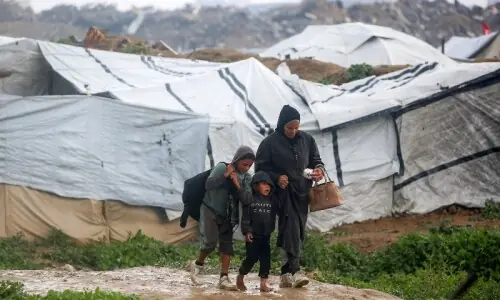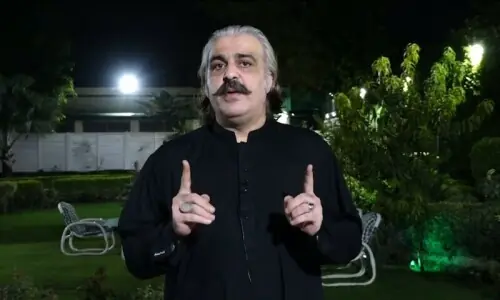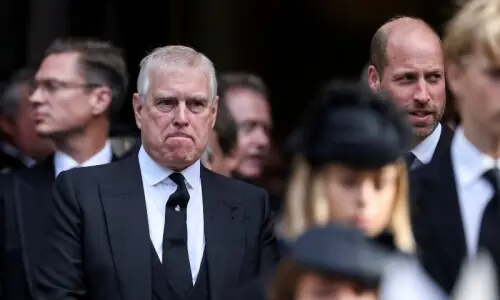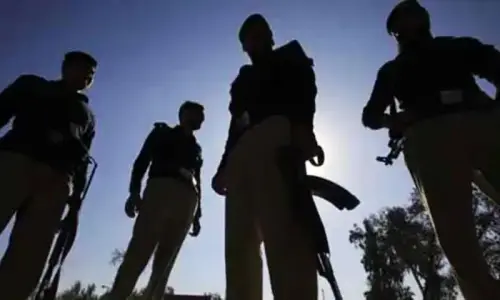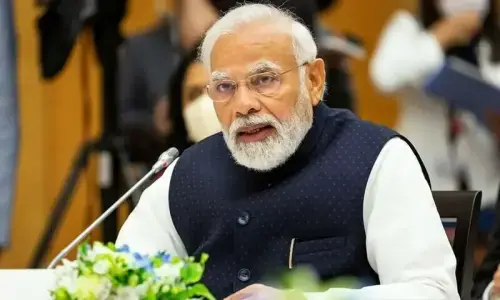LAHORE: On Christmas Day, Indian Prime Minister Narendra Modi delivered a most unexpected present to peaceniks in South Asia.
In a gesture that one news outlet described as "jaw-dropping", the Indian Prime Minister paid a seemingly spontaneous visit to Lahore on his way back home from Kabul, dropping in to chat with Prime Minister Nawaz Sharif.
Sharif personally received Modi at the airport with a warm hug and they walked away from the aeroplane holding hands firmly.
Read: Modi returns to India after surprise Pakistan visit
The two were even dressed similarly, in shalwar qameezes and short, sleeveless achkan coats.

Bold and brave
While this move is bold and brave one in any context, the fact that it has been made by Narendra Modi makes it even more surprisingly.
The Bharatiya Janata Party (BJP) hardliner has had a consistently hawkish stand on Pakistan through his career. As he ran for prime minster in 2014, he consistently attacked the Manmohan Singh government for trying to make peace with India's neighbour.
To get an idea of just how far Modi has come, one needs to watch a 2011 interview of Modi with Rajat Sharma.
In it, Modi is quite blunt about his views on Pakistan. He calls it an "enemy country" and a nation of "expert liars."
He also ridiculed the United Progressive Alliance’s policy of trying to talk peace with Pakistan and hinted at the fact that if it were up to him, he would use force to respond to the 26/11 attack on Mumbai.
"A neighbour hits you and in response you go to America!" he said. "Why don’t you go to Pakistan instead? It needs to be replied back in its own coin. Stop writing love letters to Pakistan."
Good sign for peace
To go from this to walking down the tarmac with the Prime Minster, hand-in-hand, is an amazing change and deserves much applause.
There has been so much of bad blood between India and Pakistan since 1947 that peace between the two countries is seen as a wooly-headed, somewhat whimsical idea.
In the Indian context, "candle-holder at Wagah" has become a term of ridicule synonymous with "bleeding heart liberals" or "singing Kumbaya by a campfire."
Anyone suggesting that India and Pakistan sort out their problems using dialogue is seen to be impractical at best and malevolent at worst.
Yet, as the symbolism of this impromptu visit shows, peace, dialogue and people-to-people contact with Pakistan isn't a Wagah candle-holder’s pipe dream – it’s also hard diplomacy.
Narendra Modi came into office with much of the same hawkishness that characterised his campaign and cancelled the composite dialogue process with Pakistan.
On December 9, however, the BJP went back on its decision to scrap the dialogue and, in fact, went further than even the Manmohan Singh government, by making peace with Pakistan a public event with a showmanship that is Modi’s speciality.
While this certainly marks a high point, this isn't the first time this government has made good relations with Pakistan a priority.
Foreign Minister Sushma Swaraj’s own visit to Pakistan a fortnight ago clearly signaled that the BJP government saw peace with Pakistan to be good politics – a fact that could provide a self-sustaining momentum to the Indo-Pak peace dialogue.
Also read: Indian FM plans talks on improving relations
If you’re a bleeding heart, Kumbaya singing, candle-holder at Wagah, this is a bit of 'Ache Din' right here.
This article originally appeared on Scroll.In and has been re-produced with permission.















